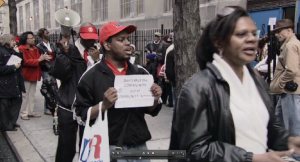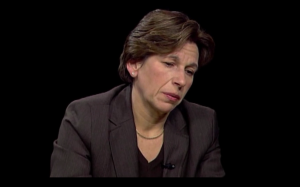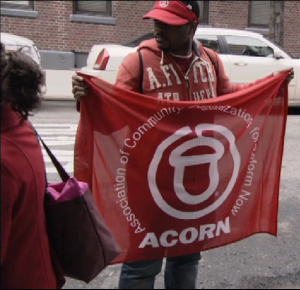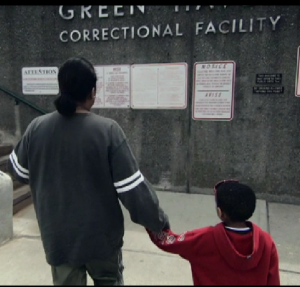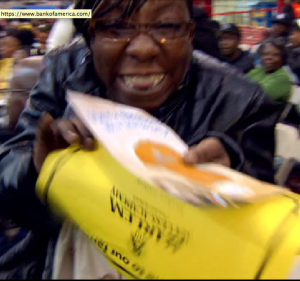The Lottery is a documentary directed by Madeleine Sackler. This film focuses on four different families throughout the New York City area that are involved in different urban schooling. These four families are currently enrolled in the charter school lottery to hopefully become a part of the Harlem Success Academy. The viewer has the opportunity to have an insight of the city’s schooling system through listening to the families, policy makers, administrators, and strong advocates speak their minds. The message that Sackler tries to communicate to the audience is that the local public schools are not giving most children the opportunities that would truly advance them. Together, as a country, we can help this problem by emphasizing the importance of education and providing equal opportunities through each school zone.
The theory of change throughout the film starts with the problem that there is not enough space for all of the students that deserve a spot, to receive a spot at Harlem Success Academy, or for that matter, any succeeding charter school. If the public school system was not failing in neighborhoods like Harlem, the charters schools would not be at such high demand. The public schools, in places like Harlem, are failing for many reasons. The emphasis gets put on the teachers, but it is also on the students. The teachers are not as qualified as other teachers throughout suburbia because of the conditions of the school, the staff, etc. With these poor conditions because of the income of the area, less qualified teachers are going to be attracted to these public schools. The students also play a factor because they are less interested in learning. The poor teachers add to this disinterest, but their home lives add to this as well. These students come mostly from poor families; there is a large chance that their families cannot even speak English or did not get diplomas from college or even high school. With unsupportive families at home and unqualified teachers, the educational success results are low. The policy chain is in affect, but has not yet worked itself out. Parts of the policy chain would be: the wait list and the attempt to gain more space for the school which would gain more students. The goals for HSA is that more students have the chance to get a better education to better educate the country, especially is higher poverty areas that are in need of this. This filmmakers did a great job in portraying these problems and goals. Documentaries can get repetitive because of too much narration on a single person. The film jumps from narrator to narrator where the viewer can see who is speaking. Being able to see the average day of the students and families really made the documentary feel real. The viewer was able to be in the classroom, in the homes of the families, on the playground, and on the streets of Harlem. Seeing all of these places in the documentary lets the viewer feel a connection.
The film makers address the problem of public and charter schools by having people with all different views and backgrounds explain how they feel about their current situation on education. Sackler focuses mostly on people that are in favor of the charter schools. When the charter schools attempted to take over some space of a local public school, the strong advocates against charter schools spoke up. That was the only time that the viewers heard the critical side of charter schooling. The critics about the charter schools stand their ground because they believe the charter school system is unfair. They don’t believe that their ways of educating the students is poor and they don’t agree with the fact that not every student will get the chance to get this education. They are also part of a teacher union and they will not let this dissipate. Their future runs on their union, and the charter schools are run completely differently which could leave them unemployed. These public school teachers believe that the charter school system is bringing about too many problems. In the United States, there are 365,000 students that are currently on a wait list for a charter school. The problem with these protestors though against charter schools come off as too harsh. Both times that they were portrayed they came off as arrogant because of how harshly they criticized the charter schools with such distaste. These critics were arrogant because of the way that the presented their ideas and concerns. Obviously they have more of a reason to worry because their income is based off of the way that the public schools run; they are also being criticized. But, the way that they present it is very aggressive. During the scene where both sides come together in the gymnasium, the critics come off as angry and forceful towards the advocates while the advocates seem to just voice their opinions with reasonable evidence.
This image is some of the members of the Association of Community Organization for Reform Now (ACORN). There are groups around the city like ACORN that are against charter schools or different types of school that take away from public schools. They hold protests hoping to inform more people about why they dislike the charter school systems. Again, this way of protest seems immature compared to the way that the advocates hold debates and lectures to inform rather than walk around with signs. They make claims like, “They only succeed because of their small class sizes,” or, “They do not educate the children with special needs (27:02).” Fortunately these claims are not true and are proven in one of Moskowitz’s conferences. She explains that the average Kindergarten class size at HSA is about 27 students, which is larger than the average public school class size. She also explains that the average amount of students with special needs is 18% which is larger than the average public school percentage (50:19).
Eva Moskowitz is the founder of the HSA and she claims that she has never heard of parents that do not care about education; she claims they just do not have the resources to help their children like the wealthier parents do (9:27). Different people throughout the film have different thoughts on why there is such a gap amongst the students and amongst the education. Gotbaum believes that poverty is the main cause of the educational problems (16:38) and that charter schools are not the answer. Gotlin believes differently and thinks that poverty is not the reason. She believes that there are many challenges, and the school has to take more of a stance and address the problems and figure out how to solve them rather than blame it on something like “poverty (17:10).”
 This is an image of Moskowitz having a conference with fellow coworkers. Personally, I really liked this scene and thought that this was a great clip because of multiple components. First, all of the employees seemed very engaged in what Moskowitz was explain during her conference. Second, the amount of writing on the board shows that the teacher really cares because it seems so intricately laid out; taking the time to use different ways of posting, different colors, etc. Lastly, the YALE sign on the door has a lot of symbolism. It allows the viewer to see that the charter schools are advocates for getting to the college level and actually into college. It is also presented that the teachers also have excellent educations, even from the best college in the country.
This is an image of Moskowitz having a conference with fellow coworkers. Personally, I really liked this scene and thought that this was a great clip because of multiple components. First, all of the employees seemed very engaged in what Moskowitz was explain during her conference. Second, the amount of writing on the board shows that the teacher really cares because it seems so intricately laid out; taking the time to use different ways of posting, different colors, etc. Lastly, the YALE sign on the door has a lot of symbolism. It allows the viewer to see that the charter schools are advocates for getting to the college level and actually into college. It is also presented that the teachers also have excellent educations, even from the best college in the country.
Jessica Reid explains that her only goal for her students is to educate them, but at public school she had little support from her coworkers and peers so it became increasingly difficult. At HSA, the support was more obvious and kept her morale boosted which resulted in her work paying off (23:21). She has meetings with coworkers that want to better their students, like Moskowitz is having above. When someone is able to speak from experience from both sides, like Reid, it adds a lot of evidence. Moskowitz states that the lottery proves that there are thousands and thousands of parents who are most likely in poverty, but are searching for a phenomenal education for their children (25:08). This proof supports Reid’s comment as well.
Louis writes an opinion piece on the Daily News about “The Lottery.” Her writing, in my opinion, was everything that I thought. SInce she is such a well educated woman and travels to see Moskowitz’s school and deeply agrees with her approach, it gives me all more of a reason to believe in Moskowitz’s methods. Louis also touches on Ravitch which I thought was interesting because we have been talking about her ideas on education. Louis explains that there are definitely hardships, she states, “That’s easier said than done. In Harlem and other communities, outstanding performance by charters has provoked envy, resentment and an organized backlash by teachers unions.” But these hardships are cancelled out by the opportunities and positivity that Moskowitz and her employees are providing for the students in Harlem.
The Lottery was a very touching film that explained, in depth, the problems behind public education in areas like Harlem. Harlem Success Academy provides opportunities for students in need, but unfortunately does not have the means to provide for enough students. In order to help fix this problem, we need to spread awareness in order for local public schools to have qualified teachers to educate the students. The more educated students we have in our country, the better the country will be.
